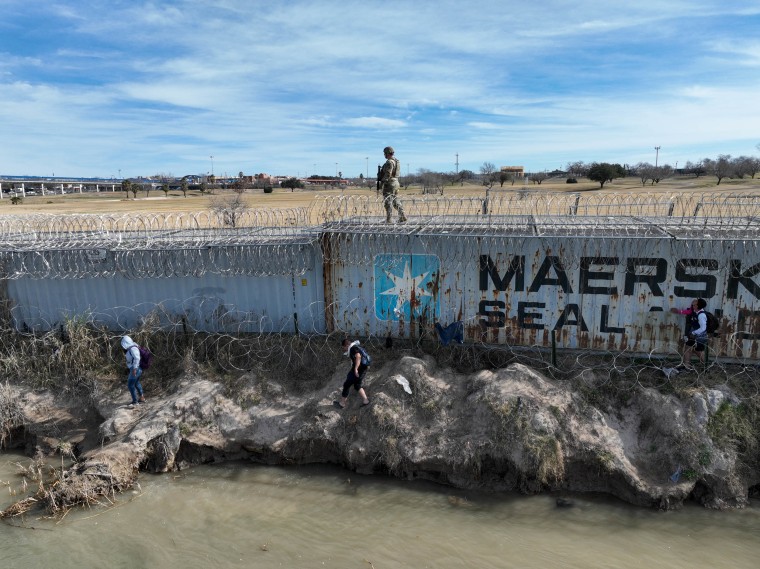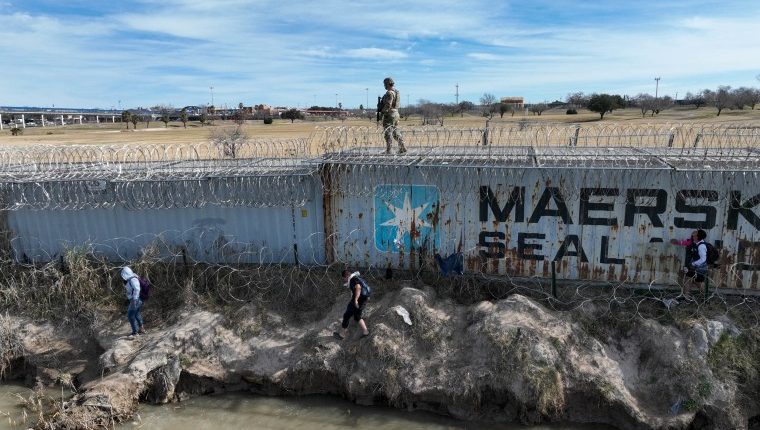EAGLE PASS, Texas — Juanita Martinez walked up to the closed gate of Shelby Park Tuesday afternoon and started an argument with a Texas National Guard member. The park was closed to the public, the young soldier said, for “safety and security.”
“Safety from what?” Martinez replied.
Martinez, the chair of the Maverick County Democratic Party, is one of many locals angry that their town has become the main stage in a national political drama. In December, record numbers of migrants crossed the Rio Grande, tens of thousands of them through Shelby Park, a 47-acre expanse of grass and ballfields on the banks of the river. In response, Gov. Greg Abbott ordered his forces to take over the park, mainly to deny access to the Border Patrol, which had previously used the park to process arriving migrants. But that also closed the park to the public.
Now Abbott is planning to use the park for yet another political purpose: He’s scheduled to hold a news conference on Sunday with 14 other governors who’ve backed him in his standoff with the federal government, including Georgia’s Brian Kemp and Iowa’s Kim Reynolds.
In Martinez’s view, Gov. Abbott’s border security measures — the troops, the barbed wire, the shipping containers, the buoys in the river — have done nothing to deter migrants, and December’s record crossings are the proof.
“It’s a big scam, it’s political propaganda,” she said. “What is our message to Abbott? Get the hell out of Maverick County and get the hell out of our park. We don’t need you here.”
Local officials in Eagle Pass have been overwhelmed on two fronts: the rising number of migrants and the state’s response to those migrants. Abbott and other Republicans maintain that migration at the border constitutes an “invasion.”
One city official, who asked not to be named because he had not been cleared to speak with the media, said the forces brought in by the governor — National Guard troops, officers with the Texas Department of Public Safety, and Florida state troopers loaned by Gov. Ron DeSantis — had damaged the irrigation system of Shelby Park’s public golf course by parking their vehicles on the grass. Repairs will strain the city’s meager budget, the official added.

NBC News reached out to the Texas National Guard, the governor’s office and Texas Department of Public Safety for comment but did not immediately receive a response.
Now city officials are nervously bracing for the arrival of yet another potentially overwhelming force: a convoy of Trump supporters on its way to, as organizers put it, “take the border back.” In advance of a rally scheduled for Saturday, self-described patriots started trickling into Eagle Pass early in the week to meet what so far has been a smaller than anticipated convoy. Organizers initially expected hundreds of thousands would join.
Some sheriffs in Texas have already asked those involved not to come.
Donna Austin and her husband, Jerry, drove more than five hours from north of Houston to “stand up for our country — not just Texas, but our whole country,” she said.
“I think there’s a lot of criminals coming across, and pedophiles,” she said. “And I think there’s people that need to come in, but it’s not being done right. They’re just letting everybody in.”
Austin clarified that she believes migrants “leaving in desperation” from their home countries ought to be given a shot to get into the U.S. That position, in the context of the ongoing Senate negotiations for a bipartisan border security bill, is to the left of President Biden and what some Democrats have suggested.
Biden is pushing for legislation that would give him the authority to “shut down the border” if migrant apprehensions reach a daily average of 5,000 over a week or 8,500 in a single day. In practice, given recent apprehension numbers, this would likely mean almost immediately empowering Border Patrol to turn away any migrants who cross illegally between ports of entry, even if they’re seeking asylum.
Such a statute may not reduce border crossings as intended, according to Theresa Cardinal Brown, immigration policy director for the Bipartisan Policy Center and a former policy official at the Department of Homeland Security. Similar approaches have been tried twice before: once with President Trump’s so-called Remain in Mexico program, and then with Title 42, the pandemic-era measure that effectively ended processing asylum at the border between March 2020 and May 2023. While these policies had temporary effects on migrant flows, in both cases the number of apprehensions at the border eventually started rising again.
More importantly, Brown said, such a policy can only be implemented with extensive cooperation by the Mexican government — something Mexico has given no indication it’s willing to do, and which would be subject to the whims of Mexican politics. “As someone who worked in international affairs for a long time, I can say that it’s unwise to put a statute in the books that can only be implemented with the cooperation of another country,” Brown said.
In the meantime, the number of Border Patrol apprehensions in January has plummeted more than 50% from December’s record highs. Experts attribute the change to seasonal fluctuations that happen almost every year, as well as a crackdown on migrant routes by Mexican authorities after a high-level U.S. diplomatic visit to Mexico City in late December.
The only migrant shelter in Eagle Pass, Mission: Border Hope, went from hosting more than 18,000 migrants over the course of December to being nearly empty Thursday. Valeria Wheeler, the shelter’s director, said she and her staff feel a bit of relief, but she prefers it when the shelter is full.
“I wouldn’t say it’s a crisis,” Wheeler said. The numbers go up and down with the seasons, and she’s come to expect the peaks: “It’s a cycle.”
One of the few migrants at the shelter on Wednesday was a woman who fled Colombia with her young son after she received threats for her political activity. She asked to go unnamed for fear of reprisals against the family she left behind.
She said she was not aware of the extent to which migration was a matter of political controversy in U.S. politics, and she hadn’t heard about Biden’s desire to “shut down” the border. She had left Colombia without much of a clear sense of what awaited her once she reached U.S. soil.
“I made the decision to leave in three days,” she said. “I didn’t have time to study things.”
For more from NBC Latino, sign up for our weekly newsletter.
Source: | This article originally belongs to Nbcnews.com










